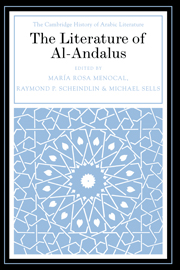5 - Knowledge
from PART I - THE SHAPES OF CULTURE
Published online by Cambridge University Press: 28 May 2012
Summary
The pleasure of the intellectual in his rational discernment, of the religious scholar in his knowledge, of the sage in his wisdom, and of the legal expert in his interpretive judgment is greater than the pleasure of the eater in his food, the drinker in his beverage, the walker in his stride, the acquirer in his gain, the player in his game, and the commander in his decree.
(Ibn Ḥazm, “Risāla fī mudāwāt al-nafs” 1:335)In Ibn Ḥazm’s enumeration of categories of knowledge and those who master them, knowledge is clearly a polysemous and multivalent phenomenon. Each area required its own terms and territories: the rational discernment (tamyīz) of the intellectual (ʿāqil), the tradition-based knowledge (ʿilm) of the religious textual scholar (ʿālim), the abstract wisdom (ḥikma) of the sage (ḥakīm), and the interpretive legal judgment (ijtihād) of the jurisprudent (mujtahid). Ibn īazm’s categories warn us against presuming too narrow a conception of “knowledge” in Andalusi culture. Ibn Ḥazm also assigns relative priority to the divisions of knowledge, valorizing intellectual over physical pleasure in consonance with much Mediterranean ethical discourse since the age of Plato and Aristotle (cf., for example, Aristotle Ethics 1.1729–42).
THE DIVISIONS OF KNOWLEDGE
The pursuit of knowledge is a structured endeavor, and each community (Muslim, Jewish, Christian) developed its own taxonomies. Such organizational formats are not constant; they carry within themselves individual histories, fault lines, and courses of development. Nevertheless, Ibn Ḥazm, who lived around the midpoint of Andalusi history and who devoted a treatise to “The Division of the Sciences” (Marātib al-ʿulūm), can offer a good introduction.
- Type
- Chapter
- Information
- The Literature of Al-Andalus , pp. 96 - 125Publisher: Cambridge University PressPrint publication year: 2000
References
- 1
- Cited by



